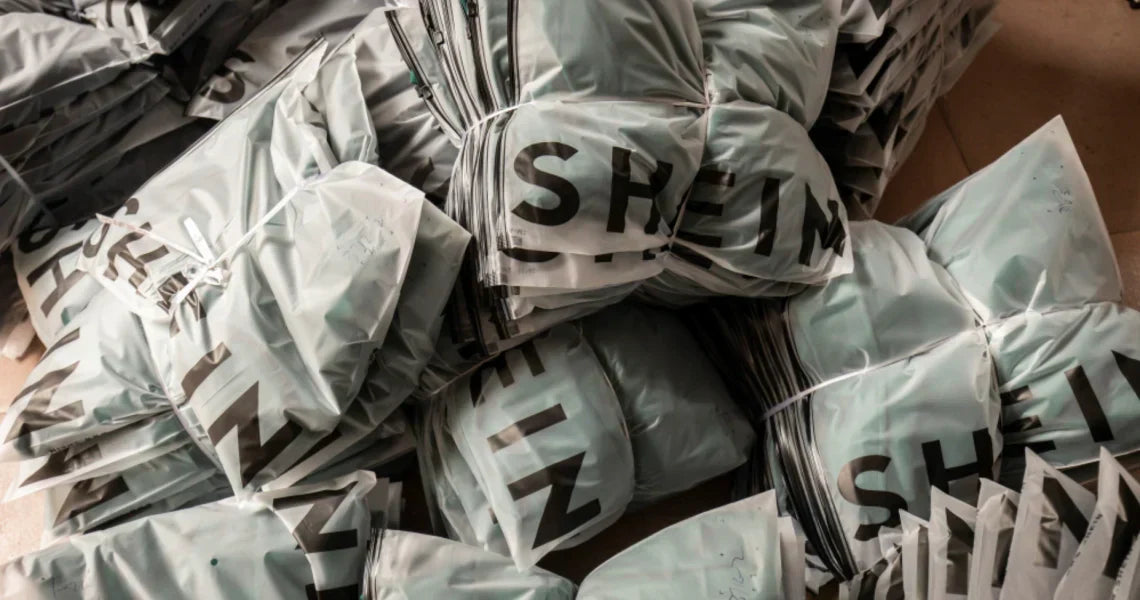Why France Is Banning SHEIN and Temu. What the UK Can Do Now
What Has France Banned Exactly?
In May 2024, France passed a new law targeting “ultra-fast fashion” platforms, specifically those offering thousands of new clothing items weekly at incredibly low prices. SHEIN and Temu were among the main players under scrutiny.
Key features of the new French law include:
-
A €5 environmental tax per item sold, rising to €10 by 2030.
-
A ban on advertising for ultra-fast fashion platforms.
-
New requirements around transparency and sustainability claims.
-
Limitations on the volume of new styles launched weekly.
This law is a direct response to the environmental toll, human rights violations, and consumer safety risks associated with ultra-cheap, mass-produced fashion.
Why Did France Target SHEIN and Temu?
These platforms represent the extreme end of hyper-consumption. SHEIN reportedly launches up to 10,000 new items every day, using algorithms and social media trends to flood the market with cheap, short-lived products. Temu, owned by Chinese giant PDD Holdings, sells everything from clothing to electronics at rock-bottom prices, often delivered from overseas warehouses with little transparency.
France’s concerns include:
-
Environmental impact: Ultra-fast fashion creates mountains of textile waste. Over 700,000 tonnes of clothing are thrown away in France every year - many of them unworn or worn once.
-
Labour exploitation: Reports have found that workers in supplier factories are paid far below minimum wage, with long hours and unsafe conditions.
-
Toxicity and health risks: Consumer watchdogs have found items with high levels of lead, phthalates, and other hazardous chemicals, especially in children’s items.
-
Digital manipulation: These platforms use manipulative “buy now” algorithms, limited-time discounts, and micro-influencer marketing to push overconsumption.
The French government’s stance is clear: fashion sold at pennies often hides real human and environmental costs.
Could the UK Introduce a Similar Ban?
Currently, no UK legislation mirrors France’s direct action. Despite growing awareness of the environmental impact of throwaway fashion, platforms like SHEIN and Temu continue to operate freely in Britain.
However, a ban or tax on ultra-fast fashion is not off the table in the long term. The Environmental Audit Committee previously called for reforms to the fashion industry, and pressure is mounting from environmental groups and sustainable fashion advocates.
But legislation takes time, and in the meantime, UK consumers, creators, and retailers can drive meaningful change without waiting for a political response.
7 Ways the UK Can Take Action Without a SHEIN Ban
1. Support Slow Fashion Brands That Disclose Their Supply Chains
One of the simplest, most powerful acts is to vote with your wallet. Brands that manufacture locally, disclose factory locations, and produce in small batches deserve support. Look for companies with certifications such as:
-
GOTS (Global Organic Textile Standard)
-
OEKO-TEX
-
Fair Wear Foundation
-
B Corporation
👀 Tip: If a fashion brand says nothing about its factory or fabric sourcing - assume the worst.
2. Use Social Media Influence Responsibly
Many SHEIN and Temu hauls go viral not because of paid ads, but because of everyday users showcasing their finds. The fastest way to normalise better behaviour is to stop glamorising overconsumption.
Instead of sharing 30-item hauls, creators can:
-
Highlight outfit rewears and restyling ideas
-
Post “1 in, 1 out” clothing swaps
-
Champion brands doing better
-
Talk openly about the dark side of overproduction
Unfollow the influencers profiting from hauls built on human exploitation and environmental collapse. Follow these ethical fashion advocates committed to social justice and sustainability:
3. Push for Retailer Accountability
Big UK retailers often act as the middle ground between SHEIN-style fast fashion and more ethical brands. Push them to:
-
Reduce the number of collections per year
-
Pay living wages to overseas workers
-
Invest in UK-based or EU manufacturing
-
Stop promoting synthetic fabrics that release microplastics
Petitions, letters, and customer feedback forms do make a difference, especially when amplified across platforms. Demand the same level of transparency that you would expect from your food supply chain.
4. Make the Hidden Costs Visible
Many people don’t associate a £3 top with toxic waste, child labour, or landfill piles, but that’s exactly what it represents.
Hard-hitting facts worth sharing:
-
One garbage truck’s worth of textiles is landfilled or incinerated every second globally (Ellen MacArthur Foundation).
-
A 2021 Swiss study found elevated levels of lead in 15% of children’s clothes purchased from Temu and SHEIN.
-
Textile production is responsible for 10% of global carbon emissions.
More than aviation and shipping combined.
5. Buy Less, Repair More
In the UK, clothing purchases have almost doubled in the last 15 years, while the average number of wears per garment has decreased. That’s not just bad for the planet, it’s bad for your wallet.
Ways to take action:
-
Embrace the 30-wear rule before buying
-
Learn to repair minor rips, buttons, or hems
-
Join local clothing repair cafés or sewing workshops
-
Invest in quality over quantity
6. Demand Label Transparency in Online Marketplaces
SHEIN and Temu thrive on minimal oversight. Unlike physical shops, they bypass many of the rules UK-based retailers must follow. One action you can take today is to demand more transparency from:
-
Amazon (hosts thousands of unlabelled items)
-
TikTok Shop
-
eBay and AliExpress
Use reviews and social media to call out vague product listings and push for better labelling on composition, manufacturing origin, and certifications.
7. Start Young: Bring Fashion Literacy into Schools
Many young people are drawn to Temu and SHEIN because of affordability and novelty. But they’re also curious and compassionate when given information.
Fashion literacy education can include:
-
What makes clothes cheap and why that’s often a red flag
-
What a sustainable material looks and feels like
-
The difference between price and value
-
Microplastic impact from synthetic fabrics
How the Spruce Community Can Lead by Example
At Spruce, we’ve long advocated for transparency, safety, and sustainability, not just in home cleaning and laundry, but in everything we touch and wear. Our own journey began by questioning what was in the products we use every day. That same curiosity should apply to our wardrobes.
Let’s use our collective voice to:
✅ Normalize buying less
✅ Question vague marketing
✅ Champion regenerative, ethical makers
✅ Avoid toxic materials in everything from clothes to homeware
✅ Share resources with friends, teachers, and schools
You don’t need to wait for a government ban to make a better choice today.
Final Thoughts: Is a Ban the Only Answer?
France’s legislative move is bold, but necessary. The UK may not follow suit right away, but that doesn’t mean we’re powerless.
While policy change is essential for large-scale transformation, every decision we make as individuals adds up. The platforms will shift if the consumer demand shifts. Let’s not underestimate the ripple effect of awareness, education, and intention.
FAQ: SHEIN and Temu Ban Explained
Is SHEIN banned in France now?
Not exactly. France hasn’t outright banned SHEIN, but the law places heavy restrictions and environmental penalties on ultra-fast fashion platforms like SHEIN and Temu.
What’s the penalty for selling ultra-cheap fashion in France?
A new environmental fee of €5 per item (rising to €10 by 2030), plus advertising restrictions and transparency mandates.
Is the UK planning a similar ban?
Not at present, but environmental groups and MPs are increasing pressure. The UK may eventually follow suit, especially as EU standards evolve.
Why are SHEIN and Temu considered problematic?
They rely on hyperproduction, questionable labour practices, and ultra-low-cost materials. Many items are made with toxic dyes, synthetic fibres, and shipped globally with minimal oversight.
Can I still buy from SHEIN and Temu in the UK?
Yes, but with growing awareness, many consumers are rethinking their support of platforms that offer short-term savings at long-term planetary cost.
A Final Word: Responsible Consumption Is a Choice.
And a Commitment.
At Spruce, we believe that every purchase is a reflection of our values, and a step toward a cleaner, fairer future. Responsible consumption isn’t just a lifestyle; it’s a critical part of UN Sustainable Development Goal 12: Responsible Consumption and Production. This goal asks individuals, businesses, and governments to reduce waste, improve supply chain transparency, and shift to more sustainable patterns.
By choosing products made with integrity, questioning greenwashing, and resisting overconsumption, you are voting for a better system, one where workers are paid fairly, toxins are kept out of our homes, and waste doesn’t end up polluting our oceans or communities.
At Spruce, this commitment shows up in everything we do, from our plastic-free packaging to our non-toxic formulations that protect people and the planet. We don’t believe in shortcuts. And we know you don’t either.
So here’s your challenge: Pause before your next impulse buy. Ask who made it, what it’s made of, and where it will end up. That’s responsible consumption. And it starts with you.






Leave a comment (all fields required)